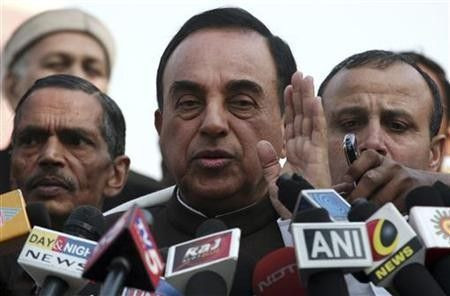2G Scam: Subramanian Swamy’s War against the Ruling Congress

Mobbed by cameramen and with two fingers raised in a victory salute, Subramanian Swamy stood before the Supreme Court on Thursday, flushed with the vindication of an unrelenting legal campaign aimed at the country's most powerful politicians.
Subramanian Swamy
A publicity-hungry former minister and disgraced Harvard professor, who is exalted by his Hindu nationalist followers as a crusading hero, Swamy has waged a decades-long war against the ruling Congress party and the Nehru-Gandhi family at its heart.
The Supreme Court ruled earlier on Thursday that telecoms licences won during a scam-tainted bidding process that may have cost the government up to $36 billion in lost revenues should be cancelled.
This is a collective failure of the government of India, declared Swamy, who was a petitioner in the case.
Swamy's fight is a political one. Amid the embarrassment for Prime Minister Manmohan Singh's government, which oversaw the sale of the licences at below-market prices, the 72-year-old eyed his next target.
I will prove that Mr Chidambaram is a crook, he told a throng of reporters, cheered by the court's order that a lower court should investigate Home Minister Palaniappan Chidambaram.
Swamy accuses Chidambaram of signing off on the telecoms deal when he was finance minister. Chidambaram denies wrongdoing.
Swamy has been here before. Spurred by his arguments, in February 2011 the court ordered the Central Bureau of Investigation (CBI) to look into the 2G scam, named after the type of mobile licences involved, and last month accepted his petition that the role of the Prime Minister's Office in the process should be examined.
While self-styled Gandhian Anna Hazare staged hunger strikes that roused public opinion against the scandal-plagued government last year, Swamy toiled in legal chambers, writing hundreds of letters and petitions, relentlessly shining a spotlight on an affair the government would rather forget.
A celebrated economist and noted foreign policy expert, Swamy is perhaps best known as a pedlar of conspiracy theories that range from the sublime to the ridiculous.
His claims, which mostly centre on Italian-born Congress party President Sonia Gandhi, include allegations that Gandhi is often spirited away by dubious Arab businessmen to Dubai, where she is hosted by agencies of countries hostile to India.
UNREALISTIC IDEAS
Swamy is president of the Janata Party, which was born of a political uprising against former Prime Minister Indira Gandhi's 1975-77 state of emergency and crushed her in elections to form the first post-independence government not led by Congress.
A trail-blazing economist with a PhD from Harvard, Swamy saw his radical policy proposals discredited by Indira Gandhi, who reportedly described him as a Santa Claus with unrealistic ideas and expelled him from the Indian Institute of Technology (IIT).
Elected to parliament five times from 1974 to 1999, Swamy fled to the United States during the emergency rule, only to flout an arrest warrant against him to attend a parliamentary session in New Delhi, cementing his name in opposition folklore.
Swamy served as minister of commerce and industry in the early 1990s, and was a member of the country's Planning Commission that would pen the blueprints for India's economic liberalisation.
In his 2G campaign, which began with letters to Prime Minister Singh in 2008, Swamy has been supported by advocate and social activist Prashant Bhushan, who is also a key member of hunger-striking Hazare's anti-corruption movement.
A prolific Tweeter, Swamy has close to 50,000 followers on the social media website. The undisputed king of India's right-wing blogosphere, his rumination on the alleged mental illnesses of Rahul Gandhi, Sonia's son and the Congress heir-apparent, spread like wildfire.
His outspoken views, however, have not been without consequence.
Harvard stripped Swamy of his teaching duties last December after he wrote an opinion piece that called for the destruction of mosques and the disenfranchising of non-Hindus.
Swamy's op-ed clearly crosses the line by demonising an entire religious community and calling for violence against their sacred places, Professor Diana L. Eck told the Harvard Crimson newspaper.
The Janata Party, a far cry from its heyday in 1977 where it secured 43 percent of the national electorate, retains minor support, mainly in India's south.
© Copyright Thomson Reuters 2024. All rights reserved.




















